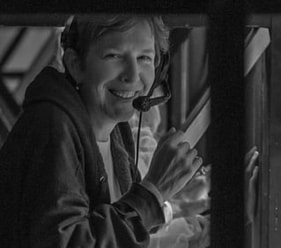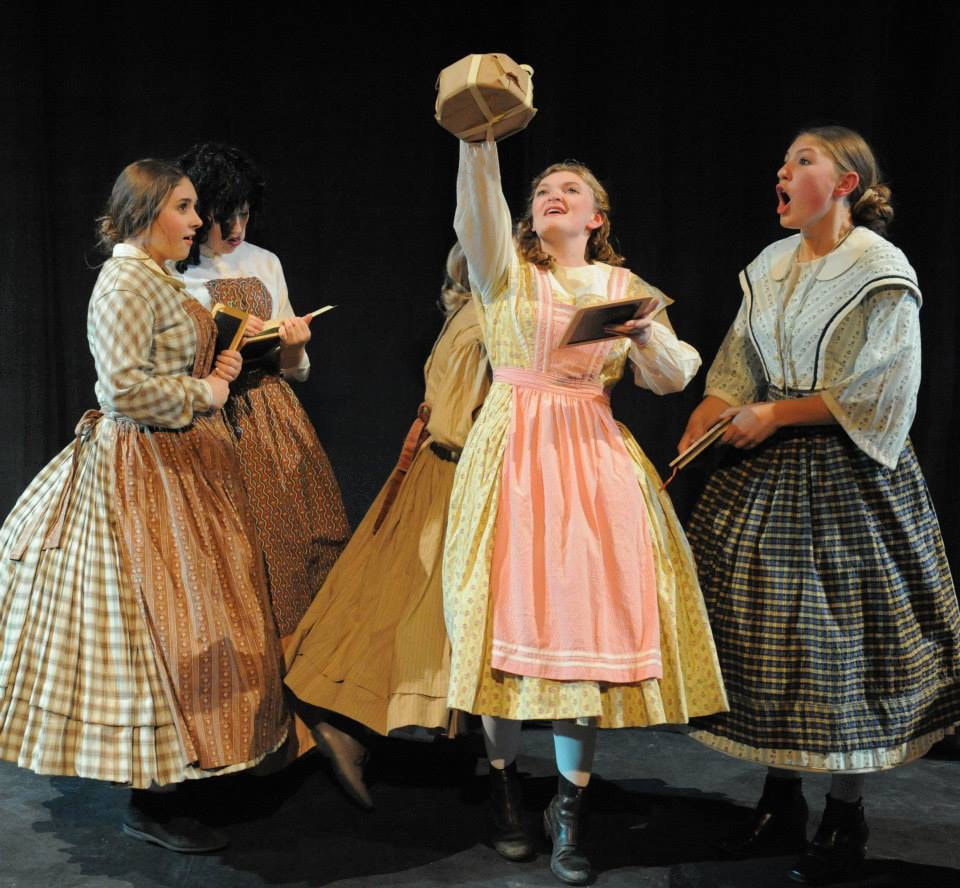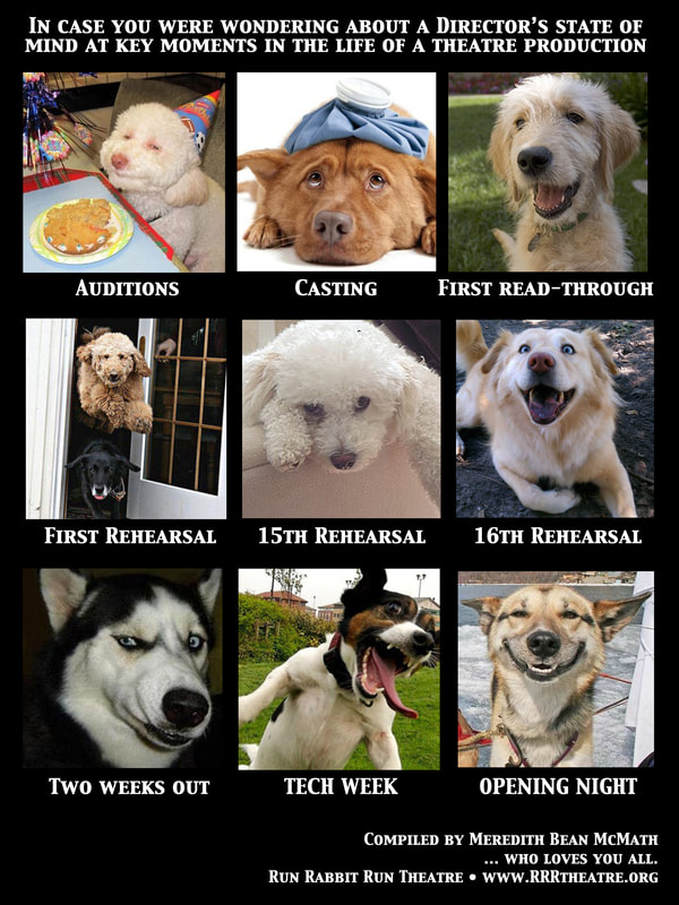 McMath Backstage - Photo by Craig Thoburn McMath Backstage - Photo by Craig Thoburn "You may have people in your life who don't expect much from you — don't value your potential or input for whatever reason: too young, too old, too inexperienced... I am not one of those people." If you’re an actor who’s been in one of our theatre productions, you've heard me say something like this the very first day. When I direct, I tend to treat young actors like they’re adults and all actors like they're professionals - each one of them with opinions and ideas that matter. And if all goes well, by the end of a production the actors own the show as much as I will... because that's when the magic happens. I’ve seen other directors' approaches. Heck, I’ve TRIED the other approaches. And if a director is brilliant and creative and can get actors to do exactly what they say, the show will shine. And everyone will feel great about being a part. And that's good. But I want actors to do so much more than just mimic my intent or the meaning of the play. BUILDING A PLAY ONE CHARACTER AT A TIME I want actors to internalize the process like professional actors do - things they would have learned in drama school. I'll start them off with a character concept, but from there they need to read the script and make that character their own. I encourage full character development, even if they have no lines or are a member of the Chorus. As we go, I'll teach Method Acting, which involves improvisation and emotional recall, and then go over how thet might best learn a script: audio, visual or movement - whatever helps an actor get where they need to be. And as rehearsals progress, I'll start soliciting their ideas. And if the idea serves to: 1. Further the plot, 2. Reveal more about their character, or 3. Set the audience up for a pay off (in this scene or later), then I’m going to want to try to work it in. When actors of any age approach a play this way, they start finding relationships and possibilities that as director I might have missed. And I will always want to be open to their idea, because amazing things might come of it. BE WILLING TO KILL YOUR FABULOUS IDEAS When I became a published author years ago, I had to defend my choices to an editor. So what if I spent five hours crafting that paragraph? If it doesn’t develop a character or relationship, further the plot, or provide a payoff, I had to be willing to let it die. Note: clearly this requires the director to know the play inside and out, because if you haven't prepared yourself, you're going to get defensive. Add a really tiny ego, and you just... might... snap. So in a my directing world, I have to be prepared and confident... but also realize they may not be the best ideas in the room. Yes, I know I have a creative brain, but why wouldn’t I tap into a larger creative brain if I had a chance? Actors have a chance to dive into these characters much more than I do. They're going to find things there I didn't see, and as the other actors do the same, relationships and situations things are going to happen - good things - "If she's going to react that way because of what happened earlier, and as her sister, I would know that, that changes the way I should react..." - if you let them happen. And, as a result of all of the above, actors begin to take ownership - of their characters, a scene and the play itself. This is where the magic begins. So even though this will replace the absolutely brilliant idea I had as the Director, well... gulp... let's do this instead. BUT WHAT ABOUT THE REALLY BAD IDEAS... Okay. What if your actor comes up with an idea that just won’t work? Is truly horrible? Makes no sense to the character's history, etc.? And they present it to everyone before I've heard it. Then I have to thank them for the idea, say No and tell them why. Why? Because 1. I want them to know suggestions are respected and appreciated, and the next one they have may be perfect (and often are), 2. Explaining why it won't work helps everyone understand more about the character, the plot or the scene mentioned, and 3. An explanation gives everyone in the cast a chance to further understand the setting, the character or the plot of the whole thing. Obviously at this point a couple of things are crucial: a directors needs to love their actors enough to know how to say no diplomatically or actors won't offer ideas for fear of retribution. But directors also need to avoid wanting actors to loooove them, or they'll never know how to say no to a bad idea, and the whole cast and the whole play will suffer. But, in the end, whether a good idea or a bad one, thanks are due to actors. Because their process and commitment is how a good play becomes great. LAY OUT THE GROUND RULES Lest you think rehearsals should devolve into a free-for-all “sharing time,” I'll point out ideas are solicited only at certain times in the process: 1. Creative input falls mostly in the beginning of the rehearsal schedule. Group discussion is good. And this is also a great time for the Director to underscore the story arc of the play, the scenes, and the characters. 2. Then when we begin to run scenes regularly, actors are asked to hold their ideas until the next break - and then share those ideas only with the director. 3. Crucial to the entire process: actors do not get to suggest what other actors can do. Ever. They can certainly ask why another character does something, but... that's it. Simple reason: every actor must be entirely focused on their own character/s, their actions, feelings, backgrounds, etc.. This is the process professional actors use, and I love bringing it to community theatre, because, when actors take this process on, shows get reviews worthy of professional productions (Think I'm lying? Check out Run Rabbit Run Theatre reviews). And when an actor is completely focused on developing their character in a scene, it often leads another actor to have a revelation about their own character. Lastly - without exception - actors should never simply tell another actor to “do it this way" or "try it this way". That would be called directing. THE GRANDE FINALE In the end, there is solid success in the "Do what I tell you" approach to directing: learning and doing a task well gives actors a sense of accomplishment and the applause is gratifying. But in the end, those actors will make the required effort – and often little more. They don't want to rock the boat, so they won’t challenge themselves to think about their choices or the process, or engage their own creativity. And they know that the same director can do the exact same show with another group of actors the next year, and it'll look and feel almost identical - with the same applause. They never get to own the show. They just... borrow it for awhile. But when actors have a chance to make the show their own, the audience immediately knows it. All the nuances are there: they aren't pretending to be someone, they're real - real three-dimensional characters, with relationships, tensions, actions - all real. And that's the ultimate audience reward. And that's professional acting at its best: when every actor - young and old - walks away knowing there will NEVER be another show like the one they just created. They own it and it will always be theirs. And that's theatre magic. -- I learned how to direct from producing dozens of shows with various directors using many techniques. But I learned the most from the best directors in the Loudoun / DC area: Dolly Stevens, Tim Jon and Tom Sweitzer. They start with respect and end with actor ownership, and now I just can't see directing any other way.
2 Comments
Oliver Skrzypczynski
9/28/2019 11:30:25 pm
Thank you for articulating the idea of actor ownership so well. I have experienced only a few highly successful productions with top down, clear visioned directors, especially in small rural theatre groups. In most cases, there may be a high technical achievement but lacking the substance and soul that comes from the performers being fully invested in the creation and act of story telling.
Reply
Meredith
9/29/2019 09:05:27 am
Thank you so much. I have a deep belief that, given the right support, anyone can put in a professional performance. This method works for me, and it was a pleasure to share it.
Reply
Leave a Reply. |

